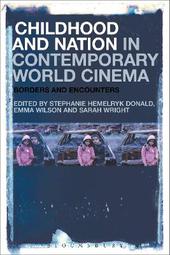
|
Childhood and Nation in Contemporary World Cinema: Borders and Encounters
Hardback
Main Details
| Title |
Childhood and Nation in Contemporary World Cinema: Borders and Encounters
|
| Authors and Contributors |
Edited by Dr. Stephanie Hemelryk Donald
|
|
Edited by Professor Emma Wilson
|
|
Edited by Dr. Sarah Wright
|
| Physical Properties |
| Format:Hardback | | Pages:296 | | Dimensions(mm): Height 229,Width 152 |
|
| Category/Genre | Film theory and criticism |
|---|
| ISBN/Barcode |
9781501318580
|
| Classifications | Dewey:791.4309 |
|---|
| Audience | | Tertiary Education (US: College) | |
|---|
| Illustrations |
40 bw illus
|
|
Publishing Details |
| Publisher |
Bloomsbury Publishing Plc
|
| Imprint |
Bloomsbury Academic USA
|
| Publication Date |
9 February 2017 |
| Publication Country |
United States
|
Description
The child has existed in cinema since the Lumiere Brothers filmed their babies having messy meals in Lyons, but it is only quite recently that scholars have paid serious attention to her/his presence on screen. Scholarly discussion is now of the highest quality and of interest to anyone concerned not only with the extent to which adult cultural conversations invoke the figure of the child, but also to those interested in exploring how film cultures can shift questions of agency and experience in relation to subjectivity. Childhood and Nation in World Cinema recognizes that the range of films and scholarship is now sufficiently extensive to invoke the world cinema mantra of pluri-vocal and pluri-central attention and interpretation. At the same time, the importance of the child in figuring ideas of nationhood is an undiminished tic in adult cultural and social consciousness. Either the child on film provokes claims on the nation or the nation claims the child. Given the waning star of national film studies, and the widely held and serious concerns over the status of the nation as a meaningful cultural unit, the point here is not to assume some extraordinary pre-social geopolitical empathy of child and political entity. Rather, the present collection observes how and why and whether the cinematic child is indeed aligned to concepts of modern nationhood, to concerns of the State, and to geo-political organizational themes and precepts.
Author Biography
Stephanie Hemelryk Donald is Distinguished Professor of Film at The University of Lincoln, UK. She is the author of Public Secrets, Public Spaces: Cinema and Civility in China (2000) and Little Friends: Children's Film and Media Culture in New China (2005), as well as many edited collections including Inert Cities: Globalization, Mobility and Suspension in Visual Culture (2014). Emma Wilson is Professor of French Literature and the Visual Arts at Corpus Christi College, UK. Sarah Wright is Reader in Hispanic Studies at Royal Holloway, University of London, UK.
ReviewsThis terrific new collection provides the emerging, vibrant, interdisciplinary field of writing on the child in cinema with a welcome new direction. Reflecting upon the shifting global geopolitical boundaries of our everyday world, it provocatively challenges, uncouples and rethinks accepted correlations between cinematic depictions of childhood and nationhood. The scholarship is engaging, often eye opening, in its illumination of the complexities of depictions of children (adopted, deported, disappeared, "left behind"), in cinemas ranging from Bollywood to South Korean animation to Argentine stop-motion to Australian indigenous films. This book will speak to anyone who was ever moved by a film about childhood to reflect on their own history, their own place within the world. * David Martin-Jones, Professor of Film Studies, University of Glasgow, UK * World Cinema is, before anything else, a school in other cultures. Children on screen, in turn, represent processes of learning from the world. In combining childhood, the nation and world cinema, this superb collection takes us on an enlightening journey around the world through the eyes of the child. It teaches us how nations are formed and destroyed, how they affect the world, and how the child is particularly affected as it grows up amidst conflicts, wars and disputes over borders. As the editors of this collection remind us, films become emotionally closer to us when there is a child protagonist, and one could add, a child's lessons on the world are closer to the truth. * Lucia Nagib, Professor in Film, University of Reading, UK * The figure of the child has been a potent symbol in many constructions an representations of national identity within various forms of visual media. Covering examples from many different historical and cultural contexts, this edited volume raises ethical challenges about such representations in an intellectually rigorous manner. This is a powerful and timely book with a truly global perspective. * Tim Bergfelder, Professor of Film, University of Southampton, UK * This important and compelling book addresses the place of children in an increasingly troubled world. A much neglected area of study in the history of the cinema, the cinematic child is explored here with great insight and depth of understanding. Childhood and Nation in Contemporary World Cinema offers an original and moving study of the power of cinema to explore ethical issues surrounding the future of the child in nations marked by war, homelessness and the search for identity. The authors explore the concept of the cinematic child from a range of national backgrounds and across a range of themes: sexuality, dispossession, war, migration, suicide, family, identity. A truly inspiring collection, this book is essential reading for anyone interested in cinematic depictions of childhood and the significance of the child in narratives about the future of all nations. * Barbara Creed, Redmond Barry Distinguished Professor in the School of Culture and Communication and author of The Monstrous-Feminine, University of Melbourne, Australia *
|